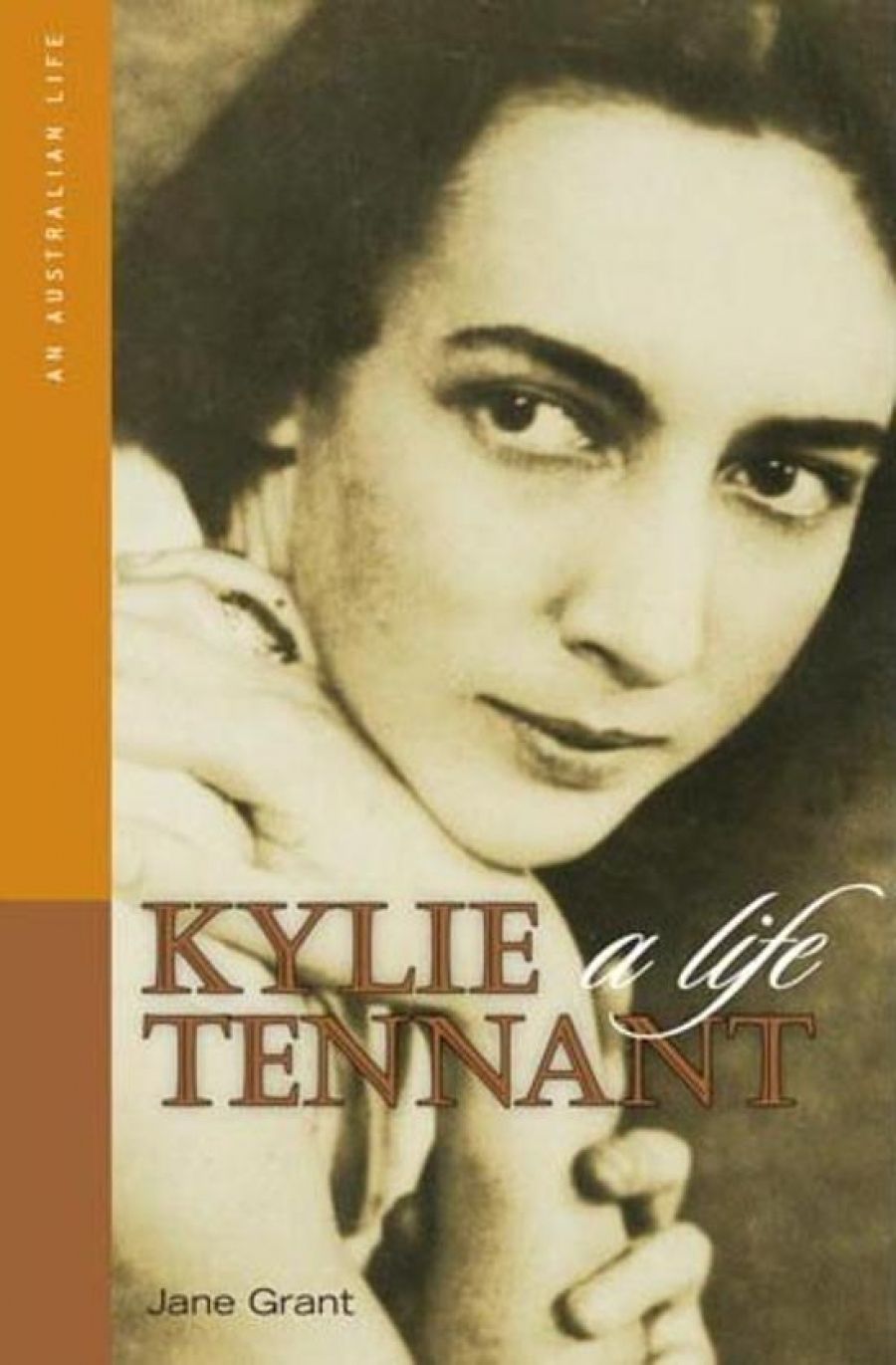
- Free Article: No
- Contents Category: Biography
- Review Article: Yes
- Online Only: No
- Custom Highlight Text:
In a 1985 interview, Kylie Tennant was quoted as saying: ‘I … don’t know how people get on who haven’t been raised in a battling Australian family.’ Jane Grant expands upon this image of Tennant as a quintessential ‘Aussie battler’ in her biography of the acclaimed novelist. Kylie Tennant: A life is relatively brief, yet it provides a remarkable insight into the pressures (societal and otherwise) that informed Tennant’s politics and prose.
- Book 1 Title: Kylie Tennant
- Book 1 Subtitle: A life
- Book 1 Biblio: NLA, $24.95 pb, 156 pp
Throughout the novel, Grant traces Tennant’s eventful and tumultuous life. The reader learns how Tennant’s inability to complete her university studies left her ‘insecure about the intellectual worth of her novels’. Grant describes the ‘scandalous’ divorce of Tennant’s parents during her childhood and (later) her own rocky marriage to Rodd. We read about the author’s abortion during the 1930s, when terminations were strictly taboo; and about her only son’s death in the 1970s.
Additionally, throughout the book Grant emphasises the strong social conscience that is reflected in much of Tennant’s work. This work includes novels such as Tiburon (1935) and The Battlers (1941). Tennant was a committed socialist who hoped, through her fiction, to bring about ‘radical political and social change’. Grant recounts the methods that Tennant used to research the social conditions she wrote about. These included the camping trips she undertook during the Depression years, in which she learned ‘what it was like to tramp the roads that led between towns and the next dole payment’. Tennant, we are informed, was also confident that she could ‘manufacture authenticity through her writing’. She once remarked: ‘If people want to know what it was like in the 1930s they could look at my books.’
Grant writes in an accessible and engaging manner, and her prose is accompanied by photographs taken at different points during Tennant’s life. The book benefits from the broad-ranging research that Grant has undertaken. She draws information from media interviews with Tennant and from reviews of her work, as well as from the author’s personal letters. Much of this material appears to have been obtained from the National Library of Australia, which published this book as part of a series of short biographies of prominent Australians. In her acknowledgments, Grant thanks Tennant’s daughter Benison Rodd for ‘sharing what at times must have been painful memories’.
Overall, I found the sections that addressed Tennant and her left-wing politics to be the most compelling. Grant paints the image of a woman who was genuinely concerned about the ‘material suffering’ she witnessed around her, and who, in her writing, was able to link this ‘suffering’ to a hierarchical ‘class system’. Grant highlights the pitfalls that critics of capitalism have encountered throughout Australian history. These pitfalls include the anti-communism that gained ascendance during the 1950s and that impacted negatively upon Tennant (who had been a member of the Australian Communist Party years before).
Admittedly, and possibly due to the book’s brevity, Grant is not able to address all of the issues she raises. For example, she discusses communist writer Jean Devanny’s accusation that Tennant was not a ‘proletarian writer’. However, apart from citing Tennant’s agreement with this charge, Grant does not really suggest what might distinguish her subject’s work from ‘proletarian’ or communist literature. Also, the accounts of Tennant’s attempts to familiarise herself with the lives of working-class Australians during the Depression were (for this reviewer, at least) fascinating. Grant could have also mentioned some of the potential shortcomings associated with the downward mobility Tennant underwent to research her fiction. These shortcomings might be best summed up in the following question: to what extent can one understand being part of the working class when one is only temporarily a ‘member’ (for want of a better term) of this social group?
That said, though, Kylie Tennant: A Life is a significant contribution to what Jan Fullerton, the director-general of the National Library of Australia, identifies in her foreword as ‘the flourishing genre’ of literary biography. Grant’s accessible prose and extensive research will make this book relevant and appealing to a wide audience. Her text has certainly affirmed Tennant’s place as one of the most important figures in Australian literature and left-wing political history.


Comments powered by CComment